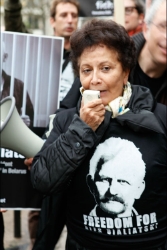Souhayr Belhassen: EU sanctions must beat in the heart of the regime
2- 13.06.2012, 11:29

Business interests of different states should not allow Lukashenko and his entourage to avoid sanctions.
Since Alyaksandr Lukashenka's problematic reelection in 2010, the human rights situation in Belarus has continued to worsen, Souhayr Belhassen, president of the International Federation for Human Rights (FIDH), says in an article published by the French magazine Altermondes.
A symbol of these crackdowns is the imprisonment of Ales Byalyatski, chairman of a human rights group called Vyasna, and vice president of the International Federation for Human Rights, Ms. Belhassen says.
His detention conditions are very difficult, but this tireless defender of freedom never complains, she says.
Ms. Belhassen quotes him as saying in a letter from prison, "I am worried for those who are on the other side of the wall. As for me, I am in the exact place where a human rights defender should be under this rotten regime."
It must be said that the harsh crackdowns that the Belarusian public has faced after the critically important 2010 presidential election have only intensified from the time of Mr. Byalyatski's arrest in August 2011, Ms. Belhassen says, adding that ruinous new laws had been adopted to ban demonstrations and smother association.
"Human rights defenders are now being prosecuted more than even before," Ms. Belhassen says. "It goes without saying that Vyasna, which has been led by Ales since its founding in 1996, continues to be held at gunpoint by the government. Valentin [Valyantsin] Stefanovich, deputy chairman of this organization, has recently been prohibited from leaving Belarus. The same thing has also happened to many other human rights defenders."
According to Ms. Belhassen, there are currently 13 political prisoners in Belarus.
The West should not be deceived by the recent release of former presidential candidate Andrey Sannikaw and his former campaign aide Dzmitry Bandarenka, she warns. "These releases are not a sign of some sort of liberalization on the part of the Lukashenko [Lukashenka] regime," she stresses. "These opposition activists were released only after severe physical and emotional torture that was used on them as a way of forcing them to sign a letter to the president asking to be pardoned."
Nevertheless, their release was possible only thanks to international pressure, Ms. Belhassen notes.
"European Union countries hardened their tone by recalling their ambassadors from Belarus in late February," she says. "However, the sanctions against Belarus must be targeted to aim at the very heart of the regime. The EU's dual strategy to vehemently express its support for Belarusian civil society and to place restrictions on the government and all individuals close to the Lukashenko regime (specifically by freezing accounts and denying visas) will only be truly effective if EU countries act as one."
However, right now the economic interests of various countries are hindering the implementation of this strategy and are helping Mr. Lukashenka and his associates escape sanctions, Ms. Belhassen says. Thus, Yury Chyzh, a businessman who is close to the Belarusian leader and falls within the scope of EU sanctions, has recently been able to conclude a large contract with Slovenian company Riko to build a luxury hotel in Minsk, she notes.
In working towards the unconditional release of Mr. Byalyatski and all other political prisoners, the EU countries must act as one against the last dictatorship in Europe, Ms. Belhassen concludes.









